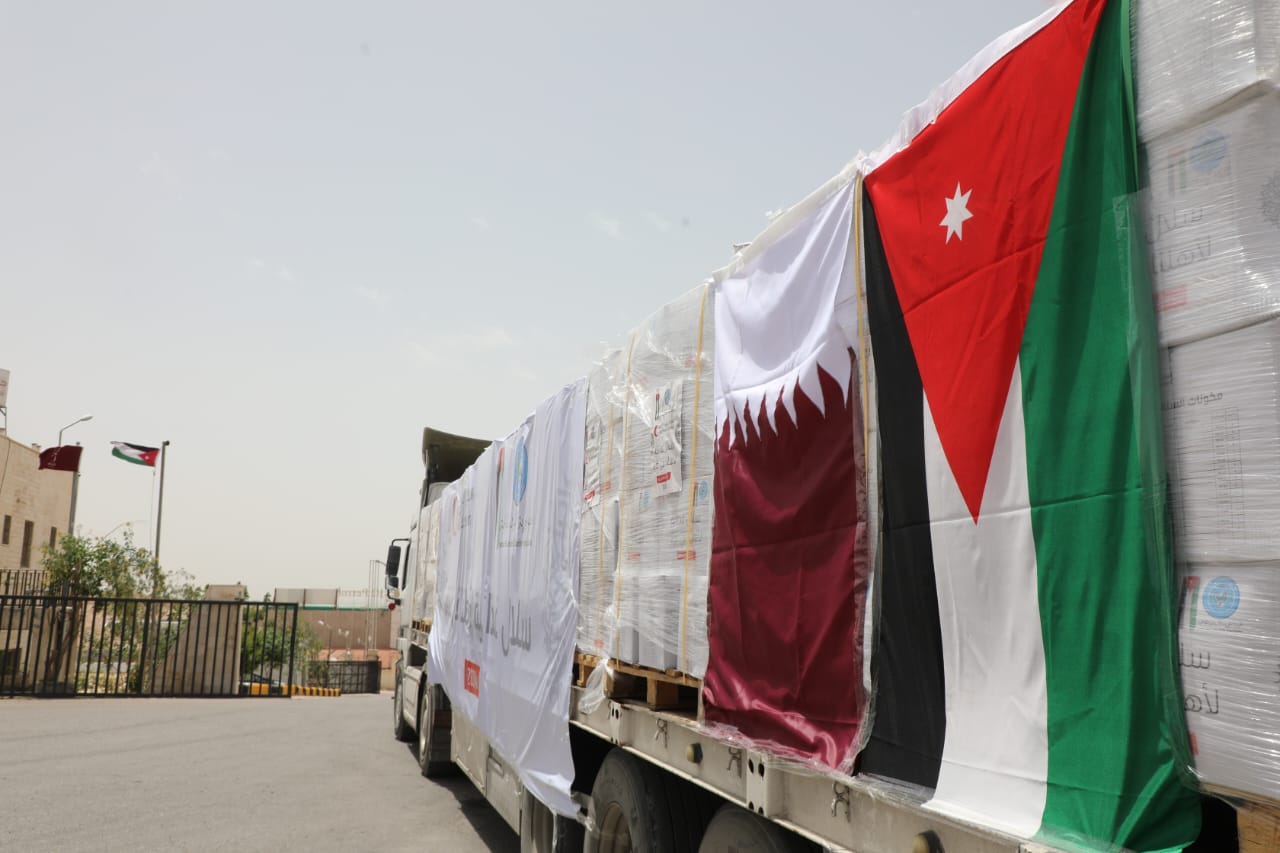Currently, the Gaza-Egypt Rafah Crossing is shut from the Palestinian side following the Israeli invasion of the border last week.
Qatar and Jordan launched the second phase of the food basket project on Saturday, aimed at providing the people of Gaza with assistance as they live under the ongoing Israeli genocide.
The initiative is a collaboration between the Qatar Red Crescent Society (QRCS) and the Jordan Hashemite Charity Organization (JHCO), in coordination with the Jordan National Red Crescent Society (JNRCS).
The Qatari and Jordanian entities launched the initiative on the second day of Eid Al Fitr in April, during which they distributed 3,296 food parcels in Rafah and Deir Al Balah.
Under the project’s latest phase, 24 trucks will transport around 12,000 food parcels from Jordan to QRCS’s office in Gaza. Each parcel included food items including rice, lentils, flour, oil, and canned food among others—enough supply for a month.
Qatar’s Ambassador to Jordan Sheikh Saud bin Nasser bin Jassim Al-Thani attended the launch event in Amman.
QRCS’s Director of Relief and International Development Division Mohamed Salah Ibrahim also praised his entity’s cooperation with JHCO and JNRCS.
He noted that the initiative “is only one of many projects being implemented since the start of the war” in Gaza, which has been ongoing since October 7, 2023.
Both countries have been leading humanitarian efforts to ensure the delivery of humanitarian assistance to Gaza while calling on the international community to press Israel to end the war.
Jordan has more than two million registered Palestine refugees, making it the largest Palestinian refugee population for UNRWA.
Last month, Israel announced plans to open a new land crossing into the Gaza Strip to facilitate the deliveries of aid from neighbouring countries, including Jordan.
Qatar has been sending aid for Gaza through Egypt’s El Arish, where most aid is being offloaded before crossing into the Strip.
Currently, the Gaza-Egypt Rafah Crossing is shut from the Palestinian side following the Israeli invasion of the border last week. The move completely blocked the entry of aid and stopped thousands awaiting urgent evacuation from leaving Gaza.
The United Nations had warned of “an epic humanitarian disaster” if Israel launched a full-scale invasion of Rafah.
Hunger levels have already been on the rise, with 1.1 million people facing catastrophic levels of food insecurity, according to the UN.
Israel is planning on intensifying its genocidal war in Gaza while rejecting all demands for a complete ceasefire.
Since the beginning of the war, Israel has killed nearly 35,000 people in Gaza and wounded 78,641 others. Nearly Gaza’s entire population have been forced to flee more than once as Israel expands its attacks and ground invasions.
Such scenes of displacement emerged over the weekend after occupation forces ordered Palestinians to flee eastern and central Rafah, despite the city being initially declared as a safe zone by Israel.
There are at least 600,000 children in Rafah, described by the UN’s Children Agency (UNICEF) as “the city of children.” At least 17,000 children in Gaza are unaccompanied or separated from their parents, according to UNICEF.
In January, Jordan’s King Abdullah II said that Israel’s war on Gaza has created “an entire generation of orphans.”
“More children have died in Gaza than in all other conflicts around the world this past year. Of those who have survived, many have lost one or both parents, an entire generation of orphans,” the Jordanian leader said at the Kigali Genocide Memorial.
While Jordan has maintained its diplomatic ties with Israel, it officially recalled its ambassador to Israel last November.
Jordan then decided to not sign a water-for-energy deal with Israel on November 17, 2023 over the Israeli aggression on the Gaza Strip.
Unlike Jordan, Qatar does not share diplomatic ties with Israel and has long refused to normalise with the occupying entity while calling for the establishment of a Palestinian state on the 1967 borders.







